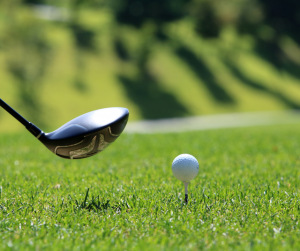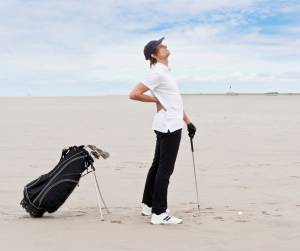Playing golf has many health benefits both physically and mentally. A full 18 hole round of golf depending on your body size can burn around 1,400 or more calories.
However, golf requires a certain level of strength, endurance, explosive power, flexibility and athletic ability to perform a movement that produces some of the fastest club head and ball speeds of any sport.
These large forces on the body can lead to many different types of injuries, which are often specific to certain areas and sides of the body in golfers, depending on their lead side.
A lot of research has been completed on the types and likelihood of injuries experienced by golfers. The wrists, back, shoulders and hips are the most commonly injured regions in professional golfers, with the leading side more frequently affected. The lower back and elbow are most frequently injured in recreational golfers, with fewer injuries resulting from overuse.
Most common causes of golfing injury..

- Overuse injuries due to playing and practicing more than required.
- Poor swing mechanics
- Gripping the club too tightly
- Previous injuries
- Not warming up effectively
- Ineffective golf set up
- Excessive rotational stresses placed to the body
The more common injuries in golf include:
- Low back pain
- Elbow pain
- Knee pain
- Shoulder and rotator cuff injuries
- Wrist injuries
- Foot and ankle injuries

Role of physiotherapy in golf related injuries:
An initial physiotherapy assessment for a golf injury would usually involve a thorough assessment, diagnosis, treatment, and rehabilitation/management plan.
However, a physiotherapist that has a specialist interest in sports can look at injury prevention and performance enhancement.
How can physiotherapy help golfers?
|
Assessment: screening functional movement, joint range of motion, muscle strength and previous injury can help highlight a weakness or restriction that may cause future injuries. This assessment will also provide very useful information to use during the rehabilitation stage and for strength and conditioning programmes. Treatment: physiotherapists can treat a wide variety of conditions including golf related injuries through multiple modalities including developing an effective exercise prescription and strength and conditioning programme. Strength and conditioning: programmes created for the individual patient aimed to rehabilitate their injury, prevent future injury and enhance performance. |
|
Remember… If you are interested in booking an appointment with one of our Chartered Physiotherapists that specialise in sports injuries or simply need some guidance, then please give us a call on 021 4633455 or book online below. We hope you enjoyed this blog by Mark Canning, Chartered Physiotherapist |
This blog is provided for information purposes only. The content is not intended to be a substitute for professional medical advice, diagnosis or treatment. Seek the advice of your doctor with any queries regarding a medical condition.
